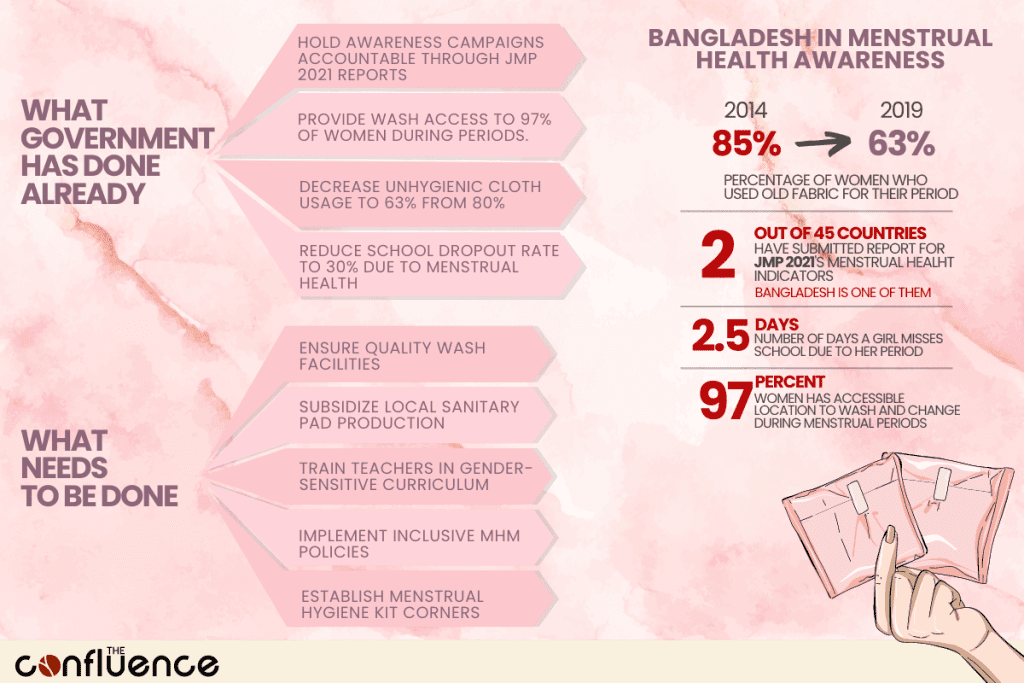Menstrual Hygiene in Bangladesh is often hindered by social stigma around menstruation. On the Menstrual Hygiene Day, we take a look at the importance for destrimatization to ensure sustainable development.
“Everything I learned about ‘it’, I learned from my mother. The school did not teach me anything significant about ‘it’. We also did not speak about ‘it’ among our friends, because ‘it’ is an embarrassing topic to discuss.” This is what my cousin Subah said when I asked her where she got her knowledge about menstrual health from. During her answer, by ‘it’ she was referring to menstrual health while consciously avoiding the terms ‘menstruation’ or ‘period’ and this was coming from a girl studying in college.
This story of Subah broadly reflects the overall situation regarding the stigmatized culture of Bangladesh, irrespective of rural or urban societies where people consider menstrual hygiene as a very sensitive topic. As a result, people, even girls, do not feel comfortable talking about menstrual health, resulting in a massive knowledge gap about menstrual hygiene management (MHM). Even though the menstrual cycle is a natural phenomenon for women of age 11 to 45 that indicates a healthy life, some people, both male, and female, especially in the underprivileged community, think of it almost as an illness and try different approaches to hide or ‘cure’ it.
Government Approach for MHM
In recent years, the policymakers in the Bangladeshi government have given MHM awareness a significant boost. In recent years, Bangladesh has made strides in several critical areas related to menstruation and menstrual hygiene management awareness. Out of 46 nations, Bangladesh is one of only two to have submitted a report for the Joint Monitoring Programme (JMP) 2021’s menstrual health indicators. According to the Bangladesh Bureau of Statistics (BBS) 2018 National Hygiene Survey, 97 percent of women had an accessible location to wash and change during their menstrual periods. In 2014, there were an average of three days per month when a girl student missed school because there were insufficient menstrual hygiene facilities. By 2019, this average has dropped to 2.5 days per month or 30 percent. In 2014, almost 85 percent of women used old fabric for their period; by 2019, that number had dropped to 63 percent.
MHM: Policy Promotion
The release of the National Menstrual Hygiene Management Strategy, 2021, is a significant accomplishment for the government of Bangladesh. The goal of this national policy is to promote strategic and organized methods for enhancing MHM in a variety of fields, including Water, Sanitation, and Hygiene (WASH), health, education, and the environment. Five guiding concepts are identified by the national strategy:
- To empower girls and women, MHM information, materials, and amenities should be made a fundamental right
- The private sector should be allowed to market MHM products that are inexpensive and easily accessible throughout the nation
- Male participation should be facilitated to establish a welcoming environment for MHM practices by girls and women;
- Adopting gender-friendly policies and mainstreaming MHM into all pertinent sectoral plans and initiatives; and finally
- Leaving no girl or woman behind.
There are certain goals these policies aim to achieve including building knowledge and skills for awareness towards positive behavioural change, creating partnerships with stakeholders and investors to manufacture quality sanitary products domestically, thus, making them more accessible and affordable, promoting and ensuring safe and environment-friendly disposal of used menstrual products, to ensure proper inclusive water, sanitary and hygiene (WaSH) facilities for all, promote social and behavioural change communication to gradually break social taboos related to menstrual health along with emphasising on the participation of men to break the gender-stigma, equip healthcare outlets to provide services to vulnerable menstruating adolescent girls and women in a women-friendly environment, and thus to achieve nation-wide menstrual hygiene management supportive strategies.
According to government data, thanks to these policies menstrual hygiene products are more available to women, even in rural areas while sustainability and accessibility increased due to the economic empowerment of women through education and skill development by implementing gender-sensitive curricula in schools and madrasas, along with positive male participation. The policies taken by the government also had a positive impact on the workplace which has become more gender-sensitive by including gender-specific toilets in industries, offices, and in public places with proper WaSH facilities.
Barriers to ensuring MHM
Although the government is adopting carefully planned policies to improve the existing state of MHM, there are several obstacles in the way of attaining the desired policies, primarily because of the huge disparity in socioeconomic status and geographic location among the beneficiaries. Some of the other issues factoring in on this are lack of timely, appropriate, and accurate information, inability to provide affordable menstrual health products in remote areas, lack of proper disposal system of the used menstrual hygiene products, and inadequate clean WaSH facilities. One of the biggest barriers is the negative patriarchal traditions that deny the gender-sensitive needs of women which is taking a lot of government and non-government effort to change gradually. This hegemonic culture also is fueled by the lack of a proper gender-sensitive curriculum. Due to this lack of a menstrual hygiene-sensitive curriculum, adolescent girls are not getting any proper formal source for getting the necessary scientific information on MHM. As a result, they rely on their family members (mother, elder sisters, close relatives) for support. Many girls feel embarrassed to discuss their menstrual health and thus further isolate themselves from the MHM conversation.
Menstruation: Why is it still taboo?
In a 2018 national hygiene study conducted by UNICEF, it was found that in Bangladesh only 53 percent of teenage schoolgirls had heard about menstruation before getting their first period. Girls and women are still told to keep their periods private and maintain their cleanliness in secret while they are menstruating. At neighbourhood drug stores, sanitary pads, napkins, and other menstrual hygiene supplies are still quickly packaged in brown bags, as if they were selling something illicit or illegal.
Several socio-cultural issues, including poverty, lack of proper knowledge, traditional hegemonic masculine norms of undermining females along with their physical and psychological needs, superstitious religious culture, discriminatory societal standards, and lack of access to basic amenities like bathrooms and sanitary goods, hinder the conversation and dissemination of information about menstrual health and cleanliness. There are also some policy shortcomings. Till now, there is no specialised policy for MHM for girls and women with disabilities, resulting in further marginalisation of a vulnerable community. Such inapt measures only worsen the current stigmatised situation, the effect of which can be seen in various sectors of the nation.
Education Sector
School attendance is directly impacted by difficulties regulating menstruation. In Bangladesh, about one-third of adolescent girls miss a few days of school each month while they are on their period, sometimes to prevent embarrassing incidents in the classroom. Instead, they use strips of cloth at home to control their bleeding.
There is also an issue of information gap in our national curriculum, which does not have proper gender-sensitive information for young adolescent girls to know about MHM. Thus schools are not becoming official institutions for such basic menstrual health-related information, which is making this discourse more alien to adolescent girls.
Economic sector
Due to a lack of proper scientific information on MHM along with the superstitious values of traditional patriarchal and religious culture that merge the concept of purity with menstrual health, the social stigma related to menstrual hygiene is hindering women from efficiently contributing to the national economy. Lack of enough gender-sensitive WaSH amenities including availability of menstrual hygiene products and places to dispose of them properly in the workplace is another reason behind the absence of a huge portion of our female workforce.
Health sector
Adolescent girls’ general health is impacted by improper MHM practices. Physical discomfort and mental tension during menstruation are brought on by unhygienic menstrual products and extended periods without using toilet facilities. Girls are unable to participate in extracurricular activities due to mobility issues and the usage of low-quality menstruation products. Improper menstrual hygiene management also affects the reproductive health of a woman by having a long-lasting physical and psychological effect on a woman’s body.
A way forward
Even though significant progress has been made with the combined effort of different government and non-government programs and projects in promoting awareness of menstrual hygiene, there is still a long way to go. In a developing country like Bangladesh, where religious values translate a lot into social values and norms, destigmatizing a very natural physical phenomenon like menstruation is very important so that women feel comfortable enough to talk about their menstrual health-related concerns. To achieve that, the following steps should be taken:
- Ensuring local production and distribution of high-quality reusable sustainable sanitary pads and napkins along with other menstrual hygiene products like tampons, menstrual cups, period underwear, etc to make them more available and affordable in the local markets by providing government subsidies to these industries.
- There should be a significant amount of gender-sensitive moderation in the national curriculum that includes scientific information on menstrual health and hygiene management.
- The teachers of both schools and madrasas should be trained to introduce the basic concepts of menstruation to adolescent girls and boys as a very natural process to break the patriarchal stigma related to menstrual health and hygiene if needed through seminars and workshops.
- The concept of MHM should be introduced to young adolescent girls from both family and educational institutions.
- The government could formulate policies so that public institutions like educational institutions (schools, colleges, madrasas, and universities), offices, and shopping malls etc. to have a menstrual hygiene kit corner that provides emergency menstrual hygiene products.
- Religious leaders should be encouraged to build awareness about being gender-sensitive and help the women in their communities with MHM.
- The government should take regular seminars and workshops on gender-sensitive WaSH concepts with the help of media and non-government organisations at the grassroots level to create MHM awareness and bring a positive change in the consciousness of mass people.
About the Author

Quazi Shuvro Salamat Rahman, a student of Development Studies at the University of Dhaka, is currently working on Project Konna at Give Bangladesh.

